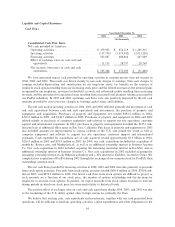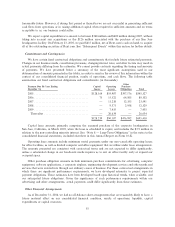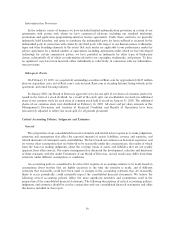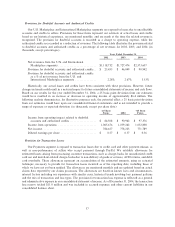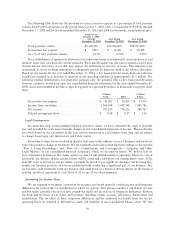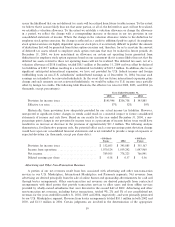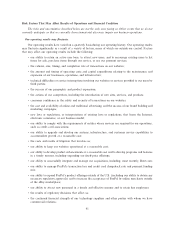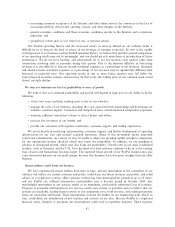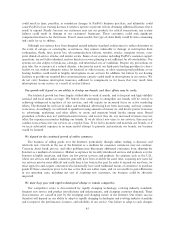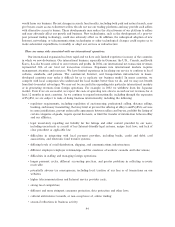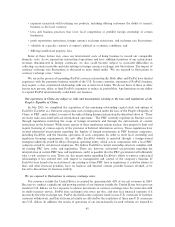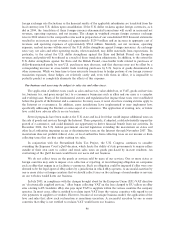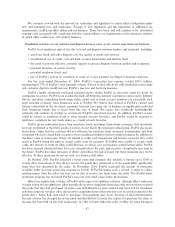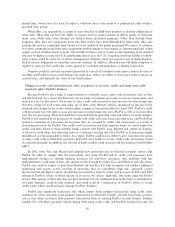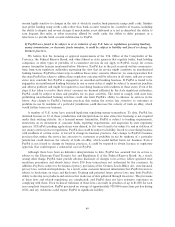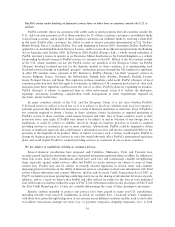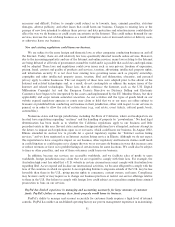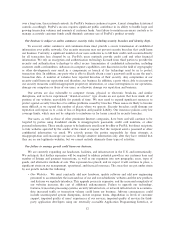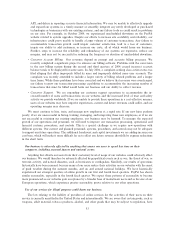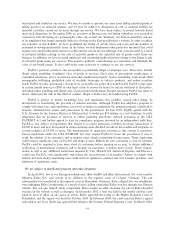eBay 2004 Annual Report Download - page 46
Download and view the complete annual report
Please find page 46 of the 2004 eBay annual report below. You can navigate through the pages in the report by either clicking on the pages listed below, or by using the keyword search tool below to find specific information within the annual report.would harm our business. Recent changes in search functionality, including both paid and natural search, may
give buyers easier access to Internet sellers who do not use our trading platforms and may provide such sellers
with alternative access to buyers. These developments may reduce the attractiveness of our platform to sellers
and may adversely aÅect our growth and business. New technologies, such as the development of a peer-to-
peer personal trading technology, could also adversely aÅect us. In addition, the widespread adoption of new
Internet, networking, or telecommunications technologies or other technological changes could require us to
make substantial expenditures to modify or adapt our services or infrastructure.
There are many risks associated with our international operations.
Our international expansion has been rapid and we have only limited experience in many of the countries
in which we now do business. Our international business, especially in Germany, the U.K., Canada, and South
Korea, has also become critical to our revenues and proÑts. In 2004, our international net transaction revenues
represented 36% of our total net transaction revenues. Expansion into international markets requires
management attention and resources. We have limited experience in localizing our service to conform to local
cultures, standards, and policies. The commercial, Internet, and transportation infrastructure in lesser-
developed countries may make it diÇcult for us to replicate our business model. In many countries, we
compete with local companies who understand the local market better than we do, and we may not beneÑt
from Ñrst-to-market advantages. We may not be successful in expanding into particular international markets
or in generating revenues from foreign operations. For example, in 2002 we withdrew from the Japanese
market. Even if we are successful, we expect the costs of operating new sites to exceed our net revenues for at
least 12 months in most countries. As we continue to expand internationally, including through the expansion
of PayPal, we are subject to risks of doing business internationally, including the following:
‚ regulatory requirements, including regulation of auctioneering, professional selling, distance selling,
banking, and money transmitting, that may limit or prevent the oÅering of eBay's and PayPal's services
in some jurisdictions, prevent enforceable agreements between sellers and buyers, prohibit the listing of
certain categories of goods, require special licensure, or limit the transfer of information between eBay
and our aÇliates;
‚ legal uncertainty regarding our liability for the listings and other content provided by our users,
including uncertainty as a result of less Internet-friendly legal systems, unique local laws, and lack of
clear precedent or applicable law;
‚ diÇculties in integrating with local payment providers, including banks, credit and debit card
associations, and electronic fund transfer systems;
‚ diÅering levels of retail distribution, shipping, and communications infrastructures;
‚ diÅerent employee/employer relationships and the existence of workers' councils and labor unions;
‚ diÇculties in staÇng and managing foreign operations;
‚ longer payment cycles, diÅerent accounting practices, and greater problems in collecting accounts
receivable;
‚ potentially adverse tax consequences, including local taxation of our fees or of transactions on our
websites;
‚ higher telecommunications and Internet service provider costs;
‚ strong local competitors;
‚ diÅerent and more stringent consumer protection, data protection and other laws;
‚ cultural ambivalence towards, or non-acceptance of, online trading;
‚ seasonal reductions in business activity;
44


